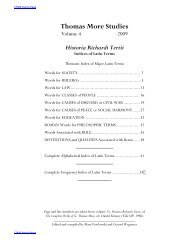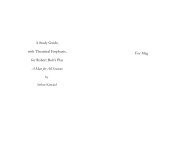life of john picus earl of mirandola - The Center for Thomas More ...
life of john picus earl of mirandola - The Center for Thomas More ...
life of john picus earl of mirandola - The Center for Thomas More ...
Create successful ePaper yourself
Turn your PDF publications into a flip-book with our unique Google optimized e-Paper software.
5<br />
10<br />
15<br />
20<br />
25<br />
30<br />
Picus’ Letter to Corneus<br />
minded that I could find in my heart in this matter to assent unto you<br />
and follow your counsel. This is a very deadly and monstrous persuasion°<br />
which hath entered the minds <strong>of</strong> men, believing that the studies <strong>of</strong><br />
philosophy are <strong>of</strong> estates° and princes either utterly not to be touched,<br />
or at leastwise with extreme lips° to be sipped, and rather to the pomp<br />
and ostentation <strong>of</strong> their wit than to the culture° ⌐ and pr<strong>of</strong>it ¬ <strong>of</strong> their<br />
minds to be little and easily tasted. <strong>The</strong> words <strong>of</strong> Neoptolemus 1 they<br />
hold utterly <strong>for</strong> a sure decree, that philosophy is to be studied either<br />
never or not long; but the sayings <strong>of</strong> wise men they repute <strong>for</strong> japes°<br />
and very fables, that sure and steadfast felicity standeth only in the<br />
goodness <strong>of</strong> the mind and that these outward things <strong>of</strong> the body or<br />
<strong>of</strong> <strong>for</strong>tune little or naught pertain unto us. But here ye will say to me<br />
thus: “ ⌐ I am content ye study, but I would have you outwardly occupied<br />
also. ¬ And I desire you not so to embrace Martha that ye should<br />
utterly <strong>for</strong>sake Mary. 2 ⌐ Love them and use them both, as well study as<br />
worldly occupation ¬ .” ⌐ Truly, my well beloved friend, ¬ in this point I<br />
gainsay° you not; they that so do I find no fault in nor I blame them<br />
not, but certainly it is not all one to say we do well if we do so, and<br />
to say we do evil but if we do so. This is far out <strong>of</strong> the way, to think<br />
that from contemplation to the active 3 living– ⌐ that is to say, from the<br />
better to the worse ¬ –is none error to decline, and to think that it were<br />
shame to abide still in the better and not decline. Shall a man then be<br />
rebuked because that° he desireth and ensueth° virtue only <strong>for</strong> itself,<br />
because he studieth the mysteries <strong>of</strong> God, because he ensearcheth the<br />
counsel <strong>of</strong> nature, because he useth continually this pleasant ease and<br />
rest, seeking none outward thing, despising¦ all other thing, since those<br />
things are able sufficiently to satisfy the desire <strong>of</strong> their followers? By this<br />
reckoning it is a thing either servile, or at the leastwise not princely, to<br />
make the study <strong>of</strong> wisdom other than mercenary. Who may well hear<br />
this, who may suffer it? Certainly he never studied <strong>for</strong> wisdom which<br />
so studied there<strong>for</strong> that in time to come either he might not 4 or would<br />
3 persuasion belief / 4 estates lords / 5 extreme lips in small doses, a little at a time / 6 culture<br />
development (OED cites this as the first usage in the sense <strong>of</strong> “cultivation or development [<strong>of</strong><br />
the mind…]” [s.v. culture sb. 4]) / 10 japes jokes / 17 gainsay contradict, deny / 23 because<br />
that if / ensueth follows<br />
¦ 26 <strong>More</strong> omits & negligens, “and neglecting” (CW 1:350, 351).<br />
1. <strong>The</strong> story <strong>of</strong> this character <strong>of</strong> Ennius is quoted in Cicero’s Tusculanae Disputationes 2.1, De<br />
Oratore 2.156, and De Re Publica 1.30.<br />
2. Martha…Mary: An allusion to Luke 10:38–42.<br />
3. active: <strong>The</strong> Latin has civilem, “political, public” (CW 1:350).<br />
4. he might not: As Edwards points out, “<strong>The</strong> Latin has merely ‘possit’…, without ‘non,’ but the<br />
sense seems to require ‘non’ here, and <strong>More</strong> may simply have supplied it. On the other hand,<br />
‘possit’ alone might mean ‘merely be able to philosophize—without actually doing it’” (CW 1:234).<br />
35<br />
A monsterous<br />
persuasion touching the<br />
philosophy<br />
[86]<br />
Felicity<br />
Contemplation<br />
<strong>The</strong> study <strong>of</strong> wisdom<br />
never to be omitted











